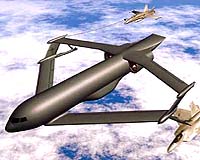| . |  |
. |
Washington (UPI) Oct 22, 2010 The U.S. State Department has announced plans to sell up to $60 billion in high-tech military aircraft to Saudi Arabia. The Wall Street Journal, which broke the story in September offering details of the deal, reported that it is the largest U.S. overseas arms deal and will require congressional authorization for the acquisition of 84 new F-15s and upgrades to Saudi Arabia existing fleet of 70 F-15s. The F-15 is manufactured by McDonnell Douglas. The deal will include 72 Black Hawk helicopters built by Sikorsky Aircraft -- a unit of United Technologies Corp., plus 70 of Boeing's Apache attack helicopters and 36 of its AH-6M Little Birds, while power for aircraft and helicopters will be provided by General Electric Co. F-110 and T700 engines. The purchase, say military analysts and diplomats, aims to bolster the region's defenses against Iran. U.S. Assistant Secretary of State for Political and Military Affairs Andrew Shapiro told a news conference this week that Washington didn't anticipate any objections to the sale from Israel, traditionally wary of increased arms sales to nearby Arab states and increasingly concerned about Iran's contentious nuclear program. "We think it will enhance regional security and stability rather than diminish it," he said. The Jerusalem Post recently reported that Israeli concerns were allayed by the fact that Saudi Arabia's shopping list didn't include long-range weapons that could potentially pose a threat to the Jewish state. In addition, the arrival of F-15s to Saudi Arabia wouldn't begin until 2015, the same year Tel Aviv is to take delivery of more advanced F-35s. The State Department's announcement of the deal also revealed that it would include up to 1,000 1-ton, bunker-buster bombs that would "enhance the capability of Saudi Arabia's air force to bomb hardened bunkers and tunnels such as those that the West believes are used by Iran to hide nuclear and ballistic programs," The Wall Street Journal reported. Tehran has long contested U.S. and Israeli concerns over its nuclear program, saying it is intended to serve only peaceful purposes. The United States has sold up to $37 billion in arms to Persian Gulf states, including Saudi Arabia, the United Arab Emirates, Bahrain, Qatar, Oman and Kuwait from 2005 to 2009. Announcement of the sale sets off a 30-day congressional review of the deal before the United States and Saudi Arabia launch more detailed talks over the sale. Despite vocal opposition by some members, the deal is expected to win strong approval.
Share This Article With Planet Earth
Related Links The Military Industrial Complex at SpaceWar.com Learn about the Superpowers of the 21st Century at SpaceWar.com
 Fuel tank key to win Air Force tanker bid
Fuel tank key to win Air Force tanker bidLondon (UPI) Oct 21, 2010 The key to winning the U.S. Air Force's $35 billion KC-X tanker competition is fuel capacity, an expert said. A tanker with a larger fuel tank can fly farther and has more fuel available for waiting jets, key in long-haul missions in the Middle East or Asia, writes Rebecca Grant, president of IRIS Independent Research, a small security industry think tank in Washington. "Factors ... read more |
|
| The content herein, unless otherwise known to be public domain, are Copyright 1995-2010 - SpaceDaily. AFP and UPI Wire Stories are copyright Agence France-Presse and United Press International. ESA Portal Reports are copyright European Space Agency. All NASA sourced material is public domain. Additional copyrights may apply in whole or part to other bona fide parties. Advertising does not imply endorsement,agreement or approval of any opinions, statements or information provided by SpaceDaily on any Web page published or hosted by SpaceDaily. Privacy Statement |